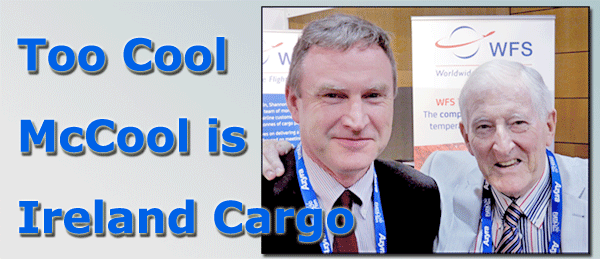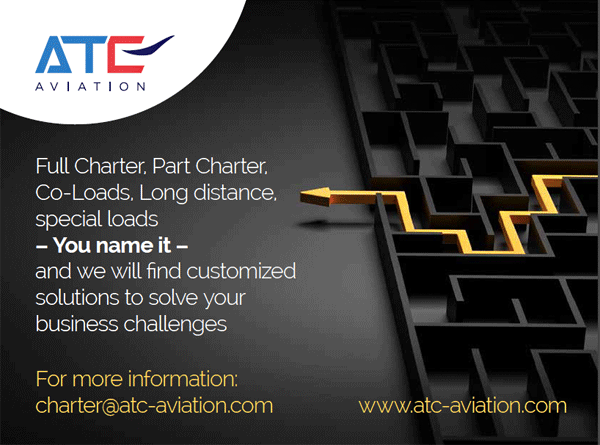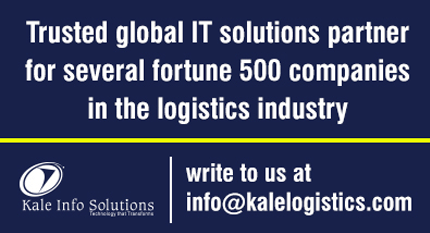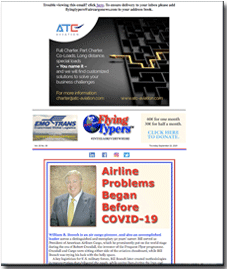 |
The quick move of IATA’s World Cargo
Symposium from a venue in IST to DUB at last minute brought to the fore
the always engaging agility and ability of Ireland to not only handle
a big show on short notice but also to have some bright and brighter people
ready, willing and able to share point of view.
Ian McCool may not be on the program at
WCS, but lucky for air cargo we caught up with him last week.
The McCool family has been architects of
Irish air cargo almost since the form was invented.
Ian is here offering some pride of place,
but more importantly to attendees of WCS this week and others tuned in
worldwide, Ian brings a sense of what’s up and matters and what
is next in Irish Air Cargo.
Ian is Too Cool McCool when it comes to
organized logistics in Ireland.
He is informed, so you be informed.
“My father Sean McCool,” Ian
said, “founder of our company and pioneer in Irish aviation history
is now 90 years old and nearly retired after having started work at Shannon
Airport in 1958.
“I am very fortunate to have learned
from one of the best transport minds in the industry,” Ian McCool
said. “My father set up the business in 1989 and I have had the
pleasure of working with him for over 30 years.”
International Airline Marketing (IAM) is
Ireland’s largest Air Cargo General Sales and Service Agent (GSSA),
responsible for approximately a quarter of all freight from Ireland.
Working on behalf of numerous world leading
airlines including American Airlines, Etihad Airways, Air Canada and All
Nippon Airways, IAM forms the core of an expanding group, which includes
cargo trucking, handling and training divisions.
“I am also very fortunate to be working
with one of the best teams in the industry.
“We see the clouds are starting to
clear and we are in for a good few years ahead. One of the things the
pandemic has taught me is that nothing is certain or static.
“I always try to prepare for the unexpected.
This is even more the case based on the experience we have gained over
the last 18 months.
Air cargo had not been at the “top
table” for many years in Ireland, but was now back again.
“Everybody talked of the importance
of air cargo but as a commodity, with over supply in certain parts of
the world, it was historically undervalued.
“This was mainly driven by the basic
economics of supply and demand and some lack of understanding of the value
of the product.”
The IAM Team Effort
“The change in our team at IAM over
the last 18 months has simply amazed me. I am so proud of what our team
has achieved.”
Staying Alive & New Streams of Business
“Initially it was about keeping the
show on the road but we quickly moved at a rapid pace and developed so
many new streams of business.
“We are now above pre-pandemic market
share levels. In recent months we have moved 30% of the air export tonnage
from Ireland as per the IATA stats.
“The support of our customers, principals,
suppliers and all the team at IAM has made this phenomenal achievement
possible,” Ian Mc Cool assures.
The IT Advantage
“We were well established with our
IT platforms, pre-pandemic, to ensure we had the ability to adapt swiftly
to remote operations.
“IAM, as others, will continue to
refine this as well, as accelerating our e-freight and digital service
offerings in 2021 as a priority.
“But for us the term – “There
is no I, in Team” — has never been more relevant than in the
last 18 months.
“Everyone at IAM pulled together to
ensure IAM adjusted to the new world.”
Setting Paperless & Other Goals For Air Cargo
“I look forward to the day where we
are completely paperless,” Ian McCool said. “I
think we are very nearly there and have seen great strides over the last
5 years but there is still some bureaucracy holding back some key trade
lanes.
“The developments in the drone sectors
changing the final mile sectors of the supply chain will be very dramatic.
The technology is improving swiftly and the regulatory bodies are close
to finalizing the controls for large-scale commercialization.
“The drive to go ‘green’
is key and has moved forward at pace over the last two years. The great
saying—There is no Planet B— has to filter down into every
organization and also requires more pressure from big business on governments.
“The majority of airports have generated
most of the revenue from passengers up to March 2020. Cargo has been a
bi-product for most airports and thus has had very little investment.
Cargo should get more of a hearing and far more consideration on investment
plans of many airport authorities. This should be the case for the near
future and may be become the new norm,” Ian McCool said.
How To Work Better
“On the work front, I am loving the
changes in the industry over the last 18 months and the fact that air
cargo and logistics have been a key part how we have survived the pandemic
and kept the world spinning.
“We get great pleasure from seeing
a shipment of life-saving pharmaceuticals taking off from DUB and knowing
it is making a massive difference to someone’s life.
“I love the fact that I am always
learning and even though I have 30 years plus experience, every week holds
a different challenge to be overcome.”
What’s Next?
“Long term planning is difficult at
the moment, but it is getting a bit clearer.
“We have had a few people approach
us over the years to see if they could buy us, but we are not interested
in selling at the moment.
“When you enjoy what you do and have
a very successful business, we see no reason to change.”
Too Cool McCool
“Ireland as a country is about to
embark on the next stage of the transition.
“The proposed harmonization of the
global tax rates may reduce Ireland’s tax advantage, but there are
many factors still very much in Ireland’s favor.
“With the UK outside of the EU, it
leaves Ireland with a strong advantage as the only EU member state with
English as its first language.
“Our skilled workforce, security,
stability, legislative system, quality of living, access to markets and
established relationships are key advantages,” Ian McCool assures.
Geoffrey
|







